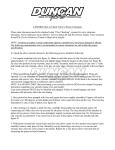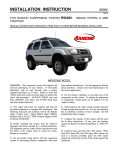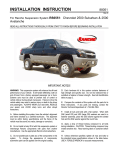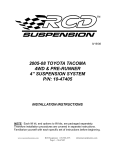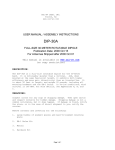Download INSTALLATION INSTRUCTIONS
Transcript
INSTALLATION INSTRUCTIONS 2005-2012 Nissan Xterra/Frontier / Pathfinder PART NUMBERS: NP17500, NP17525, NP17550 FRONTIER PATHFINDER XTERRA PARTS & CORRESPONDING HARDWARE LIST ABOVE LISTED COMPONENTS ARE USED IN ALL KITS Front Subframe (1) Cam Bolt Kit (1) 9/16” x 4.5” Bolt (2) 9/16” SAE Washer (4) 9/16” Metal Lock Nut (2) Factory Differential Mount Hardware 1/2” Metal Lock Nuts (2) Crush Sleeve (2) Sway Bar Mount (2) 1/2” x 1.25” Bolt (4) 7/16” Flat Washer (4) 1/2” Metal Lock Nut (4) Factory Mount Hardware Bump Stop Extension (2) Square U-Bolts (4) 1/2” x 1.5” Self Tap Bolt (2) 7/16” Lock Washer (8) 5/16” Self Tap (2) 7/16 Hi-Nut (8) Rear Subframe (1) Cam Bolt Kit (1) 9/16” x 4.5” Bolt (2) Coil-Over Spacer (2) 9/16” SAE Washer (4) 3/8” x 1 Bolt (6) 9/16” Metal Lock Nut (2) 3/8” Flat Washers (12) Factory Differential Mount 3/8” Nylock Nut (6) Hardware Factory Passenger Side Upper Subframe Hardware Bent Shackle Plate (2) Flat Shackle Plate (2) 1/2” x 4.5” Bolt (2) 1/2” x 5.5” Bolt (2) 7/16” Flat Washer (8) 1/2” Metal Lock Nut (4) SLE142 (2) SLE143 (2) Rear Leaf Springs (2) Bushings (8) Sleeve (4) Round U-Bolts (4) 7/16” Lock Washer (8) CALMINI Mono-Tube Shocks 7/16 Hi-Nut (8) (2) Factory Lower Mount Hardware Sway Bar Links PATHFINDER REAR Center Skid Plate (1) IRS Drop Bracket (2) Bump Stop Extension (2) 3/8” x 1 Bolt (6) 3/8” x 1.” Bolt (4) 3/8” Flat Washer (6) Spare Tire Relocation 3/8” Flat Washer (8) Bracket (1) 3/8” Nylock Nut (4) Steering Knuckle (2) Compression Struts (2) MO2782 Bushings (8) SLE139 Sleeves (4) 1/2” x 4.5” Bolt (4) 1/2” SAE Flat Washer (8) Front Brake Lines (2) 1/2” Metal Lock Nut (4) Comp. Strut Mount (2) 1/2” x 2” Bolt (1) 1/2” x 3” Bolt (2) 7/16” Flat Washers (4) Bent Shackle Plate (2) Flat Shackle Plate (2) 1/2” x 4.5” Bolt (2) 1/2” x 5.5” Bolt (2) 7/16” Flat Washer (8) 1/2” Metal Lock Nut (4) SLE142 (2) SLE143 (2) Rear Brake Lines (2) FRONTIER REAR Rear Lift Blocks Bump Stop Brackets (2) Brake Line Spacers (2) CALMINI Mono-Tube Shocks Rear Brake Lines (2) (2) CALMINI Mono-Tube Shocks (2) XTERRA REAR INSTALLATION INTRODUCTION AND OVERVIEW 1. This installation requires a professional mechanic. 2. We recommend referencing a Nissan factory service manual when installing this system as it will contain information not covered in this instruction packet. 3. Before installation, we recommend complete inspection of the vehicle’s tie rod ends, ball joints, wheel bearings, universal joints and any other serviceable items before installation of this system. It is imperative to replace all worn items as it can affect the performance of the vehicle and CALMINI is in no way responsible for the failure of factory or replaceable components. 4. Fully read the supplied instructions before attempting installation. This will allow you to gauge your knowledge of the kit and determine if it should be installed at home. 5. Check and recheck all received items immediately upon receipt of the system to ensure all items were properly received and that no components were lost or damaged in shipping. CALMINI is not responsible for lost or damaged items through shipping. CALMINI is not responsible for any delays caused or fees incurred, by damaged or lost items in shipping. We will work with UPS to make sure the necessary components are sent if the situation arises. 6. Be sure that you have all required tools necessary to complete the installation including, but not limited to: lift (floor-jack), jack stands (4), wheel blocks, etc. 7. Before working underneath any vehicle ensure that the vehicle’s wheels are properly blocked and that the frame is supported in the correct location by a competent jack stand. 8. ALWAYS WEAR SAFETY GLASSES DURING THE ENTIRE INSTALLATION OF THIS SYSTEM! 9. Torque specifications for the necessary hardware has been noted in the instructions where required. Reference supplied chart as a general guide or reference the factory service manual for those torque specifications not called out. 10.Note that every effort has been made to ensure that all components will install on your vehicle without any modifications. It is not uncommon on today’s vehicles for the frame and corresponding cross-member to move slightly upon disassembly and re-installation. For this reason, it is common to use pry bars and alignment punches to secure these aftermarket components to the vehicle. Modification of any CALMINI components will void any/all warranty on the part. TIRE AND WHEEL FITMENT / ALIGNMENT GUIDE NOTE: Due to varying manufacturing processes, published dimensions and inflated tire sizes, CALMINI recommends fitment of the tires and wheels to the vehicle prior to installation. CALMINI is not responsible for incorrect wheel/tire size combinations in conjunction with our suspension system. ACCEPTABLE TIRE & WHEEL SIZES 17” X 8” Rim 285/70/R17 305/65/R17 16” X 8” Rim 305/70/R16 285/75/R16 VEHICLE ALIGNMENT Upon complete installation of the CALMINI suspension kit, the front end will require an alignment. The alignment will be back to the factory specifications and can easily be achieved through the supplied control arm camber bolts. NOTE: All steering components affixed with cotter pins will need to be replaced upon re-installation. THESE ARE NOT INCLUDED WITH THE KIT. FRONT SUSPENSION INSTALLATION 1. Prior to installation of the CALMINI suspension system, measure the height of the vehicle for an accurate baseline measurement. Upon completion, this will ensure that all suspension components are properly installed. The measurement should be made from the wheel center to the bottom of the fender lip at both the front and rear of the vehicle. Make note of this measurement for reference at a later point. 2. If you are using a lift, properly secure the vehicle to the lift arms and raise vehicle. If using a floor jack, make sure the vehicle is in park and place the floor jack under the front cross member. Lift the front of the vehicle high enough to place jack stands behind the front wheel wells. Once properly sitting on the jack stands, ensure the rear wheels are properly blocked and/or the emergency brake is correctly engaged. 3. Remove the front wheels and also any installed skid plates that will interfere with the installation of the front end suspension components. 4. The next step will involve loosening all corresponding bolts/nuts on the front suspension. This will allow for an easier suspension removal. The nuts to loosen include: sway bar link mount on lower control arm, tie rod end jam nut, tie rod end spindle nut, upper coil-over nuts (x3), lower coil-over bolt, upper control arm nut, wheel hub nut and bottom spindle nut. This is done as many of the components will be difficult to remove if the front end is taken apart piece by piece. This procedure will need to be completed on both sides of the vehicle. DO NOT REMOVE ANY HARDWARE AT THIS TIME! 5. Locate the factory sway bar links that attach the sway bar to the lower control arm. Remove the lower portion of the sway bar link and save hardware for installation at a later point. Locate the pivot mounts for the sway bar located directly in front of the vehicle. Remove the stock pivot mount and hardware as well. Save for re-use. Sway bar can be set-aside until re-installation. 6.Unbolt and remove the brake caliper from both sides of the vehicle. The brake line will not need to be removed. The caliper will need to be secured to the frame rail utilizing zip ties or welding wire. This will allow the caliper to remain out of the workspace without damaging the brake line itself. 7. With the calipers removed and secured to the vehicle’s frame rail, the rotors on both sides can be removed for reinstallation at a later time. 8. Locate and follow the ABS line to its housing in the back of the factory steering knuckle. Remove and tie out of the work area for re-installation on the new steering knuckle at a later time. This procedure should be completed on both sides of the vehicle. 9. With the factory tie rod jam nut loose, lightly snug it back against the removable rod end. The jam nut will act as a guide for re-installation. After the jam nut adjustment, remove the rod end from the steering knuckle being cautious to not tear the boots and un-thread from the stock steering link. Complete this procedure on both sides. 10. After both tie rod ends have been removed, install them on the opposite side and tighten until you reach the jam nut. This is done as our new system relocates the steering rod ends on the top side of the steering knuckle connection point to reduce over-all angles and subsequent stress. This procedure will need to be completed on both sides. 11. On the wheel hub, remove factory cotter pin. This will not be re-used. Remove the retaining nut and save for reinstallation. This procedure will need to be completed on both sides. 12. The upper coil-over nuts (x3) can be entirely loosened and removed. The stock unit will stayed housed within the confines of the lower control arm and the upper bucket at this time. This procedure will need to be completed on both sides. 13. Support the steering knuckle from below with a stand or jack. Remove the upper control arm ball joint from the stock steering knuckle being cautious not to tear the boot. Push the upper control arm up through its range of motion and out of the way. This procedure will need to be completed on both sides. 14. Remove lower bolt holding the factory coil-over assembly and remove from vehicle. The knuckle/lower control arm assembly can be pivoted down to allow for enough clearance. This procedure will need to be completed on both sides. 15. With the knuckle still supported underneath, pivot the knuckle to the outside and push the CV assembly through to free it from the knuckle. The CV assembly will not be removed from the vehicle. Upon removal of the CV assembly from the steering knuckle, remove the pinch bolt from the lower ball joint housing on the knuckle. The part can now be removed from the vehicle. This procedure will need to be completed on both sides. 16. With the steering knuckle removed, the factory lower control arm can now be removed from the vehicle. The factory lower bolts holding the control arm to the factory sub frames will not be re-used. New cam bolts are included as part of the kit. This process will need to be completed on both sides. Once removal is completed the front end should consist of the factory cross-members and front differential (4WD models only). 17. Locate and mark the front drive shaft for orientation purposes. Un-bolt the front drive shaft from the front differential and secure out of the work space. 18. Locate and remove the factory rear cross-member. Retain the passenger side upper 2 bolts to be re-installed with the CALMINI supplied rear sub-frame. The stock cross-member will not be re-used. 19. With the factory front differential properly supported so that it cannot move, locate and remove the stock mounting hardware from the differential itself. With help, lower and set aside the front differential. Take notes of all lines and hoses so that they can be properly installed at a later time. 20. With the front differential removed, no hardware will be re-used for installation of the new components. 21. With the rear cross-member and factory front differential removed, all that should remain is the stock steering unit. On the driver’s side, locate the rear cross-member hanger and mark a horizontal line 2 11/16” from the lower lip. The vertical line will be approximately 1” from the edge. Only the lower left hole is eliminated. 22. Using a grinder, cut-off wheel, or hand plasma torch, cut along the lines to remove this portion of material. This will allow for the front differential to be properly lowered. NOTE: This step is not completed on the 2WD model. 23. Locate the supplied bump stop extensions. Now locate the upper bump stop strike plate on the vehicle. Using the supplied 1/2” bolt, install with the tab end facing the outside of the vehicle. Using a center-punch, mark the center hole of the tab on to the vehicle. Drill using a 9/32” bit and installed supplied 5/16” self tapping screw and washer. Repeat procedure for opposite side. 24. With the bracket properly notched, reassembly can begin. Begin with the front sub-frame assembly. Install the sub-frame into the stock mounting brackets using the supplied hardware. Hardware can be snugged at this time but will be tightened at a later point. 25. With the sub-frame in place, using jack stands, lift and bolt in the front differential assembly and install to sub-frame with the saved factory hardware. Hardware can be snugged at this time but will be tightened at a later point. Continue to support the differential and front sub-frame at this time. 26. Install the new rear sub-frame into the stock mounting position and secure snugly with the supplied hardware. The two saved bolts and corresponding hardware from the passenger side can be re-installed at this time as well. Hardware can be snugged at this time but will be tightened at a later point. 27. Re-install the front drive shaft using the previously marked lines as a guide. At this time also re-install or run all wires, vacuum lines, etc. to the differential that may have been removed previously. 28. Install the factory lower control arms into the installed sub-frames using the supplied cam bolts and corresponding hardware. This procedure will be completed on both sides. DO NOT TIGHTEN THESE BOLTS AT THIS TIME. THEY WILL BE TORQUED WHEN THE VEHICLE HAS THE WHEELS INSTALLED AND IS ON THE GROUND. 29 Tighten all hardware mounting the subframes to the vehicle as well differential mounting bolts as well. Torque to 95-105 ft/lbs. Also tighten all remaining hardware (less the cam bolts). 30. Using the supplied coil spacers, affix to the factory mount using the stock hardware. Torque to 18-25 ft/lbs. Install the coil-over assembly into the lower control arm using the factory hardware and position in the upper frame mount. Using supplied hardware, bolt upper spacer flange to the stock coil-bucket. Torque to 35-50 ft/lbs. Complete procedure on both sides. 31. Take all factory components currently installed on the stock steering knuckle and transfer to the CALMINI supplied knuckles. This will include and is not limited to the brake backing plate, etc. Torque to factory specifications. 32. Starting on the driver’s side, support the lower arm with a stand and install the new steering knuckle on to the lower ball joint. Re-install the factory pinch bolt and torque to 65-72 ft/lbs. 33. Now slide the factory CV shaft through the new steering knuckle from the inside of the vehicle. Tighten using the factory nut and torque to 100-105 ft/lbs. Also re-install a new cotter pin at this time. 34. At this time, the upper control arm can be installed into the steering knuckle taking caution to not rip or tear the boot. Torque to 55 ft/lbs. 35. With the CV properly installed in the steering knuckle, re-attach the steering tie rod ends to the knuckle. MAKE SURE THE JAM NUTS FROM THE EARLIER SWAP ARE PROPERLY TIGHTENED BEFORE COMPLETING THIS STEP. Torque the tie rod to 60 ft/lbs. 36. Re-connect the previously removed ABS wires and sensors into the steering knuckle. Repeat steps 31-36 on passenger side. 37. The front rotors can now be installed onto the front hubs. The calipers can also be bolted to the vehicle as well. 38. On the driver’s side pinch or clamp the stock brake line. Remove the factory banjo bolt to release the line from the caliper. Make sure to cover the caliper to keep foreign object from entering into the caliper. 39. Remove the factory soft line from the hard line along the frame. Making sure all mating surfaces are clean and free of debris, install the supplied front brake line using the supplied washers as well. Repeat installation for passenger side as well. FOLLOW THE FACTORY SERVICE MANUAL FOR PROPER BRAKE BLEEDING PROCEDURE. IT IS CRITICAL THAT THE MASTER CYLINDER DOES NOT RUN DRY AS IT WILL DAMAGE THE ABS SYSTEM. THE BRAKE SYSTEM WILL BE BLED AFTER THE REAR SUSPENSION HAS BEEN INSTALLED AS THE REAR BRAKE LINES WILL ALSO BE REPLACED WITH THIS SYSTEM. 40.Locate previously removed sway bar and corresponding hardware. Using the supplied bracket and the factory hardware, install both brackets into the stock location. The gusset will be to the outside of the vehicle. 43. Locate the compression strut brackets and corresponding sleeves. Using the supplied 1/2” x 2” bolts, insert the sleeves into the existing cross-member hole and bolt bracket to the vehicle. Install both brackets and snug hardware at this time. 44. Install compression struts on the backside of the rear sub-frame using supplied hardware and then bolt into the newly installed brackets. 45. Once the compression struts are bolted in place, tighten the compression strut brackets into place. With the brackets in place, tighten both front and rear compression struts bolts. 46. 4WD MODELS ONLY. Install center skid plate through existing holes in the subframe and with the supplied hardware bolt to the vehicle. 47. Recheck all hardware and bracketry to ensure every part is tight and installed correctly. The cam bolts should still be loose at this time. 48. The front tires and wheels can be reinstalled at this time and the front of the vehicle can be lowered to the ground. 49. With the vehicle on the ground, the front lower cam bolts can now be tighten to 105 ft/lbs. 50. Inspect the front end of the vehicle thoroughly before driving. Turn the steering wheel from lock to lock and ensure all brake lines and ABS lines are properly routed. At this time, also ensure that all parts are securely installed. 41. With the new brackets in place, reinstall the factory sway bar with the stock clamps to the new brackets. Snug hardware at this time. NOTE: On some application it may be required to either bend the lip of the coil bucket or grind a small portion of it away to allow for maximum clearance from the upper control arm. 42. Re-install the factory sway bar links to the stock lower control arm. Fully tighten all sway bar bracket mounting bolts and links on both sides. THE FRONT END WILL REQUIRE AN ALIGNMENT BEFORE DRIVING. RECHECK ALL HARDWARE AFTER 100 MILES AND EVERY OFF-ROAD USE. FRONTIER REAR SUSPENSION INSTALLATION 1. Block the front tires and loosen the rear lug nuts. Lift the rear of the vehicle with a floor jack. Support the frame with jack stands. If using an impact, the wheels can be removed with the frame on jack stands. 2. Remove the rear shocks from the vehicle. Save hardware for re-installation at a later point. 3. Remove factory rear brake lines from the vehicle and install new units supplied with the kit. Take caution to prevent foreign objects from entering the system. Reconnect all lines. FOLLOW THE FACTORY SERVICE MANUAL FOR PROPER BRAKE BLEEDING PROCEDURE. IT IS CRITICAL THAT THE MASTER CYLINDER DOES NOT RUN DRY AS IT WILL DAMAGE THE ABS SYSTEM. Once the brakes have been properly bled, fully articulate the front suspension to ensure the brake and ABS lines are free of moving suspension components. Zip tie lines out of the way if there is any interference. 4. Support the rear axle assembly with a floor jack. Loosen u-bolts on both the passenger and driver side. Fully remove the u-bolts on the passenger side. The factory ubolts and hardware will not be re-used. 5. Slowly lower the floor jack to allow the driver side to fall and install rear lift blocks. Make sure the centering pins are correctly installed. 6. With the blocks properly installed, secure the spring and block assembly to the axle using the supplied u-bolt kit. Only snug the u-bolts at this time. They will be tightened at a later time. Repeat 4-6 on the passenger side. 7. With both lift blocks installed and u-bolts snugged. Torque u-bolts to 75 ft/lbs. 8. With the axle supported, loosen all spring and shackle bolts. Remove the driver’s side bolts carefully and remove the shackle plates. No hardware will be retained. 9. Utilizing the supplied shackle sleeves, slowly lower the rear axle to allow the new longer shackles to install. Follow the factory contour of the shackle for a re-installation guide. Snug hardware at this time. Repeat this step for the passenger side also. 10. With both shackles installed, torque hardware to 85 ft/lbs. 11. Install new supplied mono-tube shocks with the retained factory hardware. Once completed on both side, tighten all four connections points. 12. Recheck all hardware and make sure all parts are properly secured. Cycle the suspension to ensure the brake lines are correctly routed. 13. Install rear wheels and lower to the ground. RECHECK ALL HARDWARE AFTER 100 MILES AND EVERY OFF-ROAD USE. SUPPLEMENTAL INSTALLATION PHOTOS













